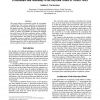Free Online Productivity Tools
i2Speak
i2Symbol
i2OCR
iTex2Img
iWeb2Print
iWeb2Shot
i2Type
iPdf2Split
iPdf2Merge
i2Bopomofo
i2Arabic
i2Style
i2Image
i2PDF
iLatex2Rtf
Sci2ools
125
click to vote
FLAIRS
2007
2007
Memory-Prediction Framework for Pattern Recognition: Performance and Suitability of the Bayesian Model of Visual Cortex
This paper explores an inferential system for recognizing visual patterns. The system is inspired by a recent memoryprediction theory and models the high-level architecture of the human neocortex. The paper describes the hierarchical architecture and recognition performance of this Bayesian model. A number of possibilities are analyzed for bringing the model closer to the theory, making it uniform, scalable, less biased and able to learn a larger variety of images and their transformations. The effect of these modifications on recognition accuracy is explored. We identify and discuss a number of both conceptual and practical challenges to the Bayesian approach as well as missing details in the theory that are needed to design a scalable and universal model.
| Added | 02 Oct 2010 |
| Updated | 02 Oct 2010 |
| Type | Conference |
| Year | 2007 |
| Where | FLAIRS |
| Authors | Saulius Juozas Garalevicius |
Comments (0)

